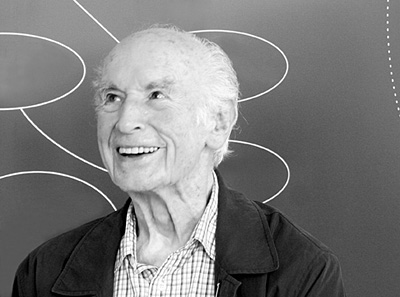Tuesday, April 16, 2013
Albert Hofmann
Albert Hofmann was a Swiss biochemist who authored over 100 scientific papers and several books during his career. He is best known for discovering and characterizing the psychedelic properties of the semisynthetic tryptamine lysergic acid diethylamide (LSD), but Dr. Hofmann was also the first person to scientifically describe psilocybin and psilocin, the active ingredients in psychedelic mushrooms, and many other compounds, psychoactive and otherwise, during his career. You can read more about him here:
Albert Hofmann
Hofmann's career was promising but not extraordinary until 70 years ago today, when he accidentally exposed himself to about a few dozen micrograms of LSD while researching derivative compounds of lysergic acid at Sandoz Laboratories in Basel. Though Hofmann first synthesized LSD five years previously, the tryptamine seemed of little interest until that spring day in 1943. The quantity of chemical he ingested was minuscule, about the size of a mote of dust, but fortunately for Hofmann and the psychonauts who followed after him (a distinguished group that includes people like Aldous Huxley, Francis Crick, and the inventor of the polymerase chain reaction process), LSD is shockingly potent. Within an hour of exposure, his imagination lit up with the kaleidoscopic imagery and synesthesia of psychedelic consciousness, and like the scientist he was, Hofmann quickly put together the root cause and sought to understand it.
The discovery of April 1943 would shape much of the rest of Hofmann's career in chemistry. Eventually he found that the curious effect of LSD on the mind stemmed from stimulating action on the brain's 5-HT2A receptors, and Hofmann characterized a wide variety of other selective serotonin receptor agonists over the next five decades. Hofmann was a talented communicator as well, and throughout the second half of his long life he spoke out against the irresponsibility of the counterculture and the CIA, and in favor of the many practical applications of psychedelics. As Korolyov and Von Braun led the exploration of the cosmos during the 20th Century, so Hofmann took the reigns of the exploration of altered consciousness.
The Wikipedia article on Hofmann is wonderful in part because much of it quotes directly from its subject. Here's Dr. Hofmann on how he came to decide on a career in chemistry:
"This [career] decision was not easy for me. I had already taken a Latin matricular exam, and therefore a career in the humanities stood out most prominently in the foreground. Moreover, an artistic career was tempting. In the end, however, it was a problem of theoretical knowledge which induced me to study chemistry, which was a great surprise to all who knew me. Mystical experiences in childhood, in which Nature was altered in magical ways, had provoked questions concerning the essence of the external, material world, and chemistry was the scientific field which might afford insights into this."
To Hofmann, the mystical and the scientific were intimately correlated, and he never saw fit to disparage either type of experience. Clearly this was a man after my own heart. On the day he turned 100 years old, reflecting on a long, surprising, and wonderful trek of discovery, Albert Hofmann had this to say about the future of the chemical he referred to as his problem child in his later years:
"It gave me an inner joy, an open mindedness, a gratefulness, open eyes and an internal sensitivity for the miracles of creation. [...] I think that in human evolution it has never been as necessary to have this substance LSD. It is just a tool to turn us into what we are supposed to be."
It's a shame that Albert Hofmann never earned a Nobel Prize for his century of contributions to science and our understanding of the mind's place in the cosmos. I think the future will look more kindly upon him than the present does.
Subscribe to:
Post Comments (Atom)

No comments:
Post a Comment